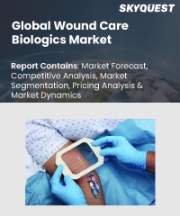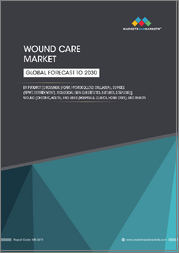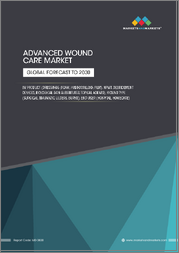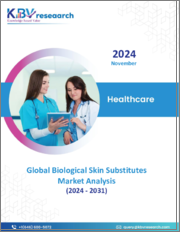
|
시장보고서
상품코드
1732952
피부 대체물 시장 - 산업규모, 점유율, 동향, 기회, 예측, 유형별, 용도별, 최종 사용자별, 지역별, 경쟁별(2020-2030년)Skin Substitutes Market - Global Industry Size, Share, Trends, Opportunity & Forecast, Segmented By Type, By Application, By End User, By Region & Competition, 2020-2030F |
||||||
세계의 피부 대체물 시장은 2024년에 3억 6,545만 달러로 평가되었으며, 2030년에는 5억 8,610만 달러에 이르고, CAGR 8.15%로 성장할 전망입니다.
만성 상처, 심한 화상, 외상성 피부 손상 등의 사례가 증가하고 있으며, 고급 상처 케어 솔루션이 필요하기 때문에 시장이 급속히 확대되고 있습니다. 고령 인구 증가, 당뇨 및 비만과 같은 동반 질환의 증가, 그리고 생체 재료 및 재생 의학 분야의 지속적인 발전이 시장의 성장 동력을 유지하고 있습니다.
| 시장 개요 | |
|---|---|
| 예측 기간 | 2026-2030년 |
| 시장 규모 : 2024년 | 3억 6,545만 달러 |
| 시장 규모 : 2030년 | 5억 8,610만 달러 |
| CAGR : 2025-2030년 | 8.15% |
| 급성장 부문 | 만성 상처 |
| 최대 시장 | 북미 |
시장 성장 촉진요인
만성상처와 급성상처 발생률 증가
주요 시장 과제
피부 대체 제품의 높은 비용과 신흥 시장의 상환 제한
주요 시장 동향
3D 바이오프린팅 및 맞춤형 의료
목차
제1장 개요
제2장 조사 방법
제3장 주요 요약
제4장 고객의 목소리
제5장 피부 대체물 시장 전망
- 시장 규모와 예측
- 금액별
- 시장 점유율 및 예측
- 유형별(생물학적, 합성)
- 용도별(급성 상처, 만성 상처)
- 최종사용자별(병원 및 진료소, 외래수술센터(ASC), 기타)
- 지역별
- 기업별(2024년)
- 시장 맵
제6장 북미의 피부 대체물 시장 전망
- 시장 규모와 예측
- 시장 점유율 및 예측
- 북미 : 국가별 분석
- 미국
- 캐나다
- 멕시코
제7장 유럽의 피부 대체물 시장 전망
- 시장 규모와 예측
- 시장 점유율 및 예측
- 유럽 : 국가별 분석
- 독일
- 영국
- 이탈리아
- 프랑스
- 스페인
제8장 아시아태평양의 피부 대체물 시장 전망
- 시장 규모와 예측
- 시장 점유율 및 예측
- 아시아태평양 : 국가별 분석
- 중국
- 인도
- 일본
- 한국
- 호주
제9장 남미의 피부 대체물 시장 전망
- 시장 규모와 예측
- 시장 점유율 및 예측
- 남미 : 국가별 분석
- 브라질
- 아르헨티나
- 콜롬비아
제10장 중동 및 아프리카의 피부 대체물 시장 전망
- 시장 규모와 예측
- 시장 점유율 및 예측
- 중동 및 아프리카 : 국가별 분석
- 남아프리카
- 사우디아라비아
- 아랍에미리트(UAE)
제11장 시장 역학
- 성장 촉진요인
- 과제
제12장 시장 동향과 발전
- 최근 동향
- 제품 출시
- 합병과 인수
제13장 세계의 피부 대체물 시장 : SWOT 분석
제14장 경쟁 구도
- Amarantus BioScience Holdings, Inc
- Organogenesis Inc.
- Smith Nephew
- Integra LifeSciences Corporation
- BSN Medical GmbH
- Molnlycke Health Care ABss
- Medtronic Plc
- Tissue Regenix Ltd.
- Stratatech Corporation
제15장 전략적 제안
제16장 기업 소개와 면책사항
SHW 25.06.04The Global Skin Substitutes Market, valued at USD 365.45 million in 2024, is poised to reach USD 586.10 million by 2030, growing at a CAGR of 8.15%. The market is experiencing rapid expansion due to rising cases of chronic wounds, severe burns, and traumatic skin injuries that require advanced wound care solutions. These products facilitate skin regeneration where conventional treatments fail. The growing elderly population, increasing comorbidities such as diabetes and obesity, and ongoing advancements in biomaterials and regenerative medicine are sustaining market momentum. Companies that align their strategies with regional healthcare needs and clinical demands are expected to gain a competitive edge in capturing future growth opportunities.
| Market Overview | |
|---|---|
| Forecast Period | 2026-2030 |
| Market Size 2024 | USD 365.45 Million |
| Market Size 2030 | USD 586.10 Million |
| CAGR 2025-2030 | 8.15% |
| Fastest Growing Segment | Chronic Wound |
| Largest Market | North America |
Key Market Drivers
Rising Incidence of Chronic and Acute Wounds
The growth of the Global Skin Substitutes Market is significantly driven by the increasing prevalence of both chronic and acute wounds. This trend presents considerable clinical and economic impacts, establishing skin substitutes as vital tools in advanced wound care. Chronic conditions like diabetic foot ulcers, pressure sores, and venous leg ulcers are on the rise, especially among elderly patients and those with diabetes, obesity, or vascular disorders. It is estimated that 15% to 34% of diabetic individuals may experience diabetic foot ulcers during their lifetime, indicating a substantial need for specialized wound care. These wounds often persist or recur, necessitating long-term treatment where skin substitutes can accelerate healing and reduce complications. With global prevalence rates of chronic wounds ranging from 1.51 to 2.21 per 1,000 people, the demand for advanced skin replacement therapies is consistent, fueling investment and innovation in this segment.
Key Market Challenges
High Cost of Skin Substitute Products and Limited Reimbursement in Emerging Markets
The elevated costs of bioengineered or cellular-based skin substitutes, stemming from complex production processes and regulatory demands, pose a major barrier to widespread adoption. While cost-effectiveness may be justified in developed regions, price sensitivity in emerging markets restricts accessibility. In many low- and middle-income countries, healthcare budgets are limited and insurance coverage is inadequate, hindering the adoption of high-cost therapies. Even in wealthier nations, restricted reimbursement policies-especially for outpatient use-limit market penetration. Consequently, manufacturers must demonstrate strong clinical and economic benefits to secure coverage, which can slow the pace of adoption and market growth, particularly in Asia-Pacific, Latin America, and Eastern Europe.
Key Market Trends
3D Bioprinting and Personalized Medicine
Technological advancements such as 3D bioprinting, stem cell engineering, and genomic profiling are transforming the skin substitute market. 3D bioprinting allows for the creation of patient-specific skin grafts that align with the wound's shape and tissue structure, enhancing integration and recovery. Personalized medicine enables customization of skin substitutes based on a patient's unique biology, improving therapeutic outcomes. Companies adopting AI-driven modeling and innovative biomaterials are setting new standards for product efficacy. This trend is drawing investor interest and academic partnerships, accelerating commercialization and enabling premium product positioning.
Key Market Players
- Amarantus BioScience Holdings, Inc
- Organogenesis Inc.
- Smith+Nephew
- Integra LifeSciences Corporation
- BSN Medical GmbH
- Molnlycke Health Care ABss
- Medtronic Plc
- Tissue Regenix Ltd.
- Stratatech Corporation
Report Scope:
In this report, the Global Skin Substitutes Market has been segmented into the following categories, in addition to the industry trends which have also been detailed below:
Skin Substitutes Market, By Type:
- Biological
- Synthetic
Skin Substitutes Market, By Application:
- Acute Wounds
- Chronic Wounds
Skin Substitutes Market, By End User:
- Hospitals & Clinics
- Ambulatory Surgery Centers
- Others
Skin Substitutes Market, By Region:
- North America
- United States
- Canada
- Mexico
- Europe
- France
- United Kingdom
- Italy
- Germany
- Spain
- Asia-Pacific
- China
- India
- Japan
- Australia
- South Korea
- South America
- Brazil
- Argentina
- Colombia
- Middle East & Africa
- South Africa
- Saudi Arabia
- UAE
Competitive Landscape
Company Profiles: Detailed analysis of the major companies present in the Global Skin Substitutes Market.
Available Customizations:
Global Skin Substitutes market report with the given market data, TechSci Research offers customizations according to a company's specific needs. The following customization options are available for the report:
Company Information
- Detailed analysis and profiling of additional market players (up to five).
Table of Contents
1. Product Overview
- 1.1. Market Definition
- 1.2. Scope of the Market
- 1.2.1. Markets Covered
- 1.2.2. Years Considered for Study
- 1.2.3. Key Market Segmentations
2. Research Methodology
- 2.1. Objective of the Study
- 2.2. Baseline Methodology
- 2.3. Key Industry Partners
- 2.4. Major Association and Secondary Sources
- 2.5. Forecasting Methodology
- 2.6. Data Triangulation & Validation
- 2.7. Assumptions and Limitations
3. Executive Summary
- 3.1. Overview of the Market
- 3.2. Overview of Key Market Segmentations
- 3.3. Overview of Key Market Players
- 3.4. Overview of Key Regions/Countries
- 3.5. Overview of Market Drivers, Challenges, Trends
4. Voice of Customer
5. Skin Substitutes Market Outlook
- 5.1. Market Size & Forecast
- 5.1.1. By Value
- 5.2. Market Share & Forecast
- 5.2.1. By Type (Biological, Synthetic)
- 5.2.2. By Application (Acute Wounds, Chronic Wounds)
- 5.2.3. By End User (Hospitals & Clinics, Ambulatory Surgery Centers, Others)
- 5.2.4. By Region
- 5.2.5. By Company (2024)
- 5.3. Market Map
6. North America Skin Substitutes Market Outlook
- 6.1. Market Size & Forecast
- 6.1.1. By Value
- 6.2. Market Share & Forecast
- 6.2.1. By Type
- 6.2.2. By Application
- 6.2.3. By End User
- 6.2.4. By Country
- 6.3. North America: Country Analysis
- 6.3.1. United States Skin Substitutes Market Outlook
- 6.3.1.1. Market Size & Forecast
- 6.3.1.1.1. By Value
- 6.3.1.2. Market Share & Forecast
- 6.3.1.2.1. By Type
- 6.3.1.2.2. By Application
- 6.3.1.2.3. By End User
- 6.3.1.1. Market Size & Forecast
- 6.3.2. Canada Skin Substitutes Market Outlook
- 6.3.2.1. Market Size & Forecast
- 6.3.2.1.1. By Value
- 6.3.2.2. Market Share & Forecast
- 6.3.2.2.1. By Type
- 6.3.2.2.2. By Application
- 6.3.2.2.3. By End User
- 6.3.2.1. Market Size & Forecast
- 6.3.3. Mexico Skin Substitutes Market Outlook
- 6.3.3.1. Market Size & Forecast
- 6.3.3.1.1. By Value
- 6.3.3.2. Market Share & Forecast
- 6.3.3.2.1. By Type
- 6.3.3.2.2. By Application
- 6.3.3.2.3. By End User
- 6.3.3.1. Market Size & Forecast
- 6.3.1. United States Skin Substitutes Market Outlook
7. Europe Skin Substitutes Market Outlook
- 7.1. Market Size & Forecast
- 7.1.1. By Value
- 7.2. Market Share & Forecast
- 7.2.1. By Type
- 7.2.2. By Application
- 7.2.3. By End User
- 7.2.4. By Country
- 7.3. Europe: Country Analysis
- 7.3.1. Germany Skin Substitutes Market Outlook
- 7.3.1.1. Market Size & Forecast
- 7.3.1.1.1. By Value
- 7.3.1.2. Market Share & Forecast
- 7.3.1.2.1. By Type
- 7.3.1.2.2. By Application
- 7.3.1.2.3. By End User
- 7.3.1.1. Market Size & Forecast
- 7.3.2. United Kingdom Skin Substitutes Market Outlook
- 7.3.2.1. Market Size & Forecast
- 7.3.2.1.1. By Value
- 7.3.2.2. Market Share & Forecast
- 7.3.2.2.1. By Type
- 7.3.2.2.2. By Application
- 7.3.2.2.3. By End User
- 7.3.2.1. Market Size & Forecast
- 7.3.3. Italy Skin Substitutes Market Outlook
- 7.3.3.1. Market Size & Forecast
- 7.3.3.1.1. By Value
- 7.3.3.2. Market Share & Forecast
- 7.3.3.2.1. By Type
- 7.3.3.2.2. By Application
- 7.3.3.2.3. By End User
- 7.3.3.1. Market Size & Forecast
- 7.3.4. France Skin Substitutes Market Outlook
- 7.3.4.1. Market Size & Forecast
- 7.3.4.1.1. By Value
- 7.3.4.2. Market Share & Forecast
- 7.3.4.2.1. By Type
- 7.3.4.2.2. By Application
- 7.3.4.2.3. By End User
- 7.3.4.1. Market Size & Forecast
- 7.3.5. Spain Skin Substitutes Market Outlook
- 7.3.5.1. Market Size & Forecast
- 7.3.5.1.1. By Value
- 7.3.5.2. Market Share & Forecast
- 7.3.5.2.1. By Type
- 7.3.5.2.2. By Application
- 7.3.5.2.3. By End User
- 7.3.5.1. Market Size & Forecast
- 7.3.1. Germany Skin Substitutes Market Outlook
8. Asia-Pacific Skin Substitutes Market Outlook
- 8.1. Market Size & Forecast
- 8.1.1. By Value
- 8.2. Market Share & Forecast
- 8.2.1. By Type
- 8.2.2. By Application
- 8.2.3. By End User
- 8.2.4. By Country
- 8.3. Asia-Pacific: Country Analysis
- 8.3.1. China Skin Substitutes Market Outlook
- 8.3.1.1. Market Size & Forecast
- 8.3.1.1.1. By Value
- 8.3.1.2. Market Share & Forecast
- 8.3.1.2.1. By Type
- 8.3.1.2.2. By Application
- 8.3.1.2.3. By End User
- 8.3.1.1. Market Size & Forecast
- 8.3.2. India Skin Substitutes Market Outlook
- 8.3.2.1. Market Size & Forecast
- 8.3.2.1.1. By Value
- 8.3.2.2. Market Share & Forecast
- 8.3.2.2.1. By Type
- 8.3.2.2.2. By Application
- 8.3.2.2.3. By End User
- 8.3.2.1. Market Size & Forecast
- 8.3.3. Japan Skin Substitutes Market Outlook
- 8.3.3.1. Market Size & Forecast
- 8.3.3.1.1. By Value
- 8.3.3.2. Market Share & Forecast
- 8.3.3.2.1. By Type
- 8.3.3.2.2. By Application
- 8.3.3.2.3. By End User
- 8.3.3.1. Market Size & Forecast
- 8.3.4. South Korea Skin Substitutes Market Outlook
- 8.3.4.1. Market Size & Forecast
- 8.3.4.1.1. By Value
- 8.3.4.2. Market Share & Forecast
- 8.3.4.2.1. By Type
- 8.3.4.2.2. By Application
- 8.3.4.2.3. By End User
- 8.3.4.1. Market Size & Forecast
- 8.3.5. Australia Skin Substitutes Market Outlook
- 8.3.5.1. Market Size & Forecast
- 8.3.5.1.1. By Value
- 8.3.5.2. Market Share & Forecast
- 8.3.5.2.1. By Type
- 8.3.5.2.2. By Application
- 8.3.5.2.3. By End User
- 8.3.5.1. Market Size & Forecast
- 8.3.1. China Skin Substitutes Market Outlook
9. South America Skin Substitutes Market Outlook
- 9.1. Market Size & Forecast
- 9.1.1. By Value
- 9.2. Market Share & Forecast
- 9.2.1. By Type
- 9.2.2. By Application
- 9.2.3. By End User
- 9.2.4. By Country
- 9.3. South America: Country Analysis
- 9.3.1. Brazil Skin Substitutes Market Outlook
- 9.3.1.1. Market Size & Forecast
- 9.3.1.1.1. By Value
- 9.3.1.2. Market Share & Forecast
- 9.3.1.2.1. By Type
- 9.3.1.2.2. By Application
- 9.3.1.2.3. By End User
- 9.3.1.1. Market Size & Forecast
- 9.3.2. Argentina Skin Substitutes Market Outlook
- 9.3.2.1. Market Size & Forecast
- 9.3.2.1.1. By Value
- 9.3.2.2. Market Share & Forecast
- 9.3.2.2.1. By Type
- 9.3.2.2.2. By Application
- 9.3.2.2.3. By End User
- 9.3.2.1. Market Size & Forecast
- 9.3.3. Colombia Skin Substitutes Market Outlook
- 9.3.3.1. Market Size & Forecast
- 9.3.3.1.1. By Value
- 9.3.3.2. Market Share & Forecast
- 9.3.3.2.1. By Type
- 9.3.3.2.2. By Application
- 9.3.3.2.3. By End User
- 9.3.3.1. Market Size & Forecast
- 9.3.1. Brazil Skin Substitutes Market Outlook
10. Middle East and Africa Skin Substitutes Market Outlook
- 10.1. Market Size & Forecast
- 10.1.1. By Value
- 10.2. Market Share & Forecast
- 10.2.1. By Type
- 10.2.2. By Application
- 10.2.3. By End User
- 10.2.4. By Country
- 10.3. MEA: Country Analysis
- 10.3.1. South Africa Skin Substitutes Market Outlook
- 10.3.1.1. Market Size & Forecast
- 10.3.1.1.1. By Value
- 10.3.1.2. Market Share & Forecast
- 10.3.1.2.1. By Type
- 10.3.1.2.2. By Application
- 10.3.1.2.3. By End User
- 10.3.1.1. Market Size & Forecast
- 10.3.2. Saudi Arabia Skin Substitutes Market Outlook
- 10.3.2.1. Market Size & Forecast
- 10.3.2.1.1. By Value
- 10.3.2.2. Market Share & Forecast
- 10.3.2.2.1. By Type
- 10.3.2.2.2. By Application
- 10.3.2.2.3. By End User
- 10.3.2.1. Market Size & Forecast
- 10.3.3. UAE Skin Substitutes Market Outlook
- 10.3.3.1. Market Size & Forecast
- 10.3.3.1.1. By Value
- 10.3.3.2. Market Share & Forecast
- 10.3.3.2.1. By Type
- 10.3.3.2.2. By Application
- 10.3.3.2.3. By End User
- 10.3.3.1. Market Size & Forecast
- 10.3.1. South Africa Skin Substitutes Market Outlook
11. Market Dynamics
- 11.1. Drivers
- 11.2. Challenges
12. Market Trends & Developments
- 12.1. Recent Developments
- 12.2. Product Launches
- 12.3. Mergers & Acquisitions
13. Global Skin Substitutes Market: SWOT Analysis
14. Competitive Landscape
- 14.1. Amarantus BioScience Holdings, Inc
- 14.1.1. Business Overview
- 14.1.2. Product & Service Offerings
- 14.1.3. Recent Developments
- 14.1.4. Financials (If Listed)
- 14.1.5. Key Personnel
- 14.1.6. SWOT Analysis
- 14.2. Organogenesis Inc.
- 14.3. Smith+Nephew
- 14.4. Integra LifeSciences Corporation
- 14.5. BSN Medical GmbH
- 14.6. Molnlycke Health Care ABss
- 14.7. Medtronic Plc
- 14.8. Tissue Regenix Ltd.
- 14.9. Stratatech Corporation
15. Strategic Recommendations
16. About Us & Disclaimer
(주말 및 공휴일 제외)


















